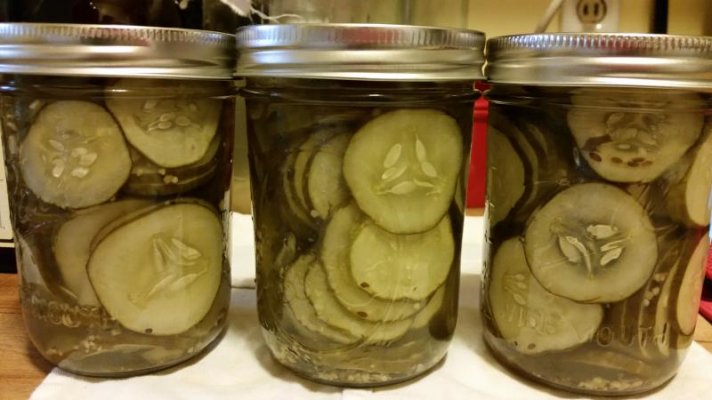larry_stewart
Master Chef
Its that time of year again, and have a dozen or so kirbies ready to go ( and probably a few more dozen on the way).
Right off the bat, I have no intentions in canning or storing the pickles for a long time, strictly to make and eat. Also, will be sour, half sour, dill...( I hate sweet cucumber pickles).
All that being said, I've seen and tried several techniques over the years , and just did a search which also vary in their methods.
One method is to dissolve the salt in room temperature water, add the spices,garlic... Pour into a jar filled with tightly packed cukes. Let sit on the counter for several days to a week ( depending on how pickled you want them)
Another method was similar, but to bring the contents ( salt, water, spices ...) to a boil. Pour the hot brine over the cukes in the jar, and let sit on the counter several days to a week.
Another method similar to the one above, but let the brine cool prior to pouring on to the cukes
Other methods say to place directly in the fridge and let them sit there for the week.
So, I guess my questions are:
-Room temperature brine vs hot brine to pour over cukes ?
-Store on the counter vs Store in the fridge during the pickling process?
again, I'm not interested in canning or preserving for long periods of time. Im actually known for testing a pickle each day ( since i like them during all stages of the pickling process), so by the time they reach the full amount of pickling, they are usually all gone anyway.
As far as specific recipes go, Im open to suggestions, but its more the process of pickling Im interested in, not necessarily the recipe itself.
Thanks ,
Larry
Right off the bat, I have no intentions in canning or storing the pickles for a long time, strictly to make and eat. Also, will be sour, half sour, dill...( I hate sweet cucumber pickles).
All that being said, I've seen and tried several techniques over the years , and just did a search which also vary in their methods.
One method is to dissolve the salt in room temperature water, add the spices,garlic... Pour into a jar filled with tightly packed cukes. Let sit on the counter for several days to a week ( depending on how pickled you want them)
Another method was similar, but to bring the contents ( salt, water, spices ...) to a boil. Pour the hot brine over the cukes in the jar, and let sit on the counter several days to a week.
Another method similar to the one above, but let the brine cool prior to pouring on to the cukes
Other methods say to place directly in the fridge and let them sit there for the week.
So, I guess my questions are:
-Room temperature brine vs hot brine to pour over cukes ?
-Store on the counter vs Store in the fridge during the pickling process?
again, I'm not interested in canning or preserving for long periods of time. Im actually known for testing a pickle each day ( since i like them during all stages of the pickling process), so by the time they reach the full amount of pickling, they are usually all gone anyway.
As far as specific recipes go, Im open to suggestions, but its more the process of pickling Im interested in, not necessarily the recipe itself.
Thanks ,
Larry

